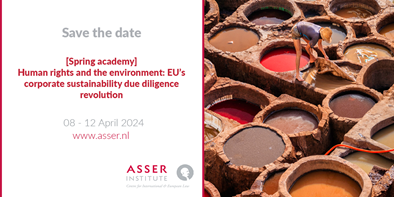[Interview] Antoine Duval: 'Human rights due diligence is underpinned by a fundamental double movement'
Published 29 September 2023By Lisa Ameline

(c) Shutterstock
Antoine Duval is a senior researcher at the Asser Institute where he focuses on transnational private regulation and business and human rights. In an article in the Nordic Journal of Human Rights, he examines the background of human rights due diligence, in particular how prof. John Ruggie envisioned the interaction between the public and private. 'Human rights due diligence is underpinned by a fundamental double movement.' An interview.
Can you briefly explain what human rights due diligence (HRDD) is?
Human rights due diligence is a process devised by the Special Representative of the Secretary-General on human rights and transnational corporations, the late prof. John Ruggie and his team. It is aimed at ensuring that businesses respect human rights throughout the web of activities linked to their products and services, what I refer to as their ‘functional territory’. HRDD was first introduced in its current structure in the United Nations Guiding Principles on Business and Human Rights (UNGPs).
Why do you think it is important to look at the ideas behind HRDD?
The main reason to do so is that HRDD, or similar processes such as sustainability due diligence at the EU level, is spreading fast, especially in Europe. It is quickly becoming the gold standard for corporations to tackle the adverse human rights and environmental impacts linked to their activities. Ruggie hoped that the unanimous endorsement of the UNGPs by the U.N. Human Rights Council would anchor them, and by association also HRDD, as the authoritative document shaping the boundaries of the responsibility of business to respect human rights. The growing number of countries implementing mandatory HRDD through legislation is the living proof of his success in this regard.
What specific issues was HRDD designed to solve? Can you explain Ruggie’s strategy in leveraging HRDD to solve these issues?
HRDD comes as a crucial response to Ruggie’s fundamental diagnosis: that globalisation has freed the economy from the purview of states, opening governance gaps that lead to a range of negative human rights and environmental impacts. As I show in my article, Ruggie is sceptical of the states’ capacity to address these gaps through national or international law. That’s why he proposes to harness the transnational governance capacity of businesses and civil society through HRDD. I also suggest that HRDD is underpinned by a fundamental double movement: On the one hand it directs and empowers businesses to govern their functional territory (e.g. their value chains) as it relates to human rights and the environment. On the other hand, HRDD constrains that power by requiring that this transnational governance be exercised transparently and with the input of affected stakeholders.
Your article reflects on the process and the theory of Ruggie's ideas. As you were saying, these have had a massive impact on the current approach to business and human rights. In your view, is giving more power to businesses in the hope that they mitigate their own human rights impact clever or is it overly optimistic?
Well, that’s a fundamental question that I refuse to answer definitively in the article. On the one hand, I believe HRDD is a clever way to try to bypass real issues faced by states in governing transnational corporations, which are both extremely mobile and resourceful. On the other hand, I have strong doubts that businesses will readily become governance entities acting in the public interest. As long as corporate executives account primarily to shareholders, the bottom line will remain their focus. Their personal incentives will continue to drive them towards pushing down costs, which means making sure that HRDD is not too expensive for a company to comply with. In order to change this dynamic, we would need to see aggressive enforcement and an expansive interpretation of the obligation to conduct HRDD by national administrations and courts, and I have serious doubts that this will happen. For example, the first decisions of the French courts in cases involving the Loi sur le devoir de vigilance are not pointing towards such strict enforcement.
In your article, you also highlight the importance of transparency and public participation in the HRDD process. Do you believe the public and affected stakeholders have the necessary information and understanding of business and human rights issues to hold companies accountable?
Here, you’re putting the finger on a very important dimension of HRDD. If I’m right in my analysis, the effectiveness and legitimacy of HRDD depends crucially on its internal countermovement: the publicisation of corporate/private governance. In this regard, I don’t think the main problem will be the lack of knowledge of affected stakeholders about business and human rights issues. In fact, they often have first-hand knowledge about the social and environmental impacts of extractive or manufacturing activities on their lives and environments. The problematic issues will rather be how they participate in the HRDD process and the level of decision-making power they will have. Who is to participate? When? If all affected stakeholders cannot be at the table, which will usually be the case, how should they be represented? What should the power of stakeholders be? Should they have the right to propose or refuse actions? Should they have veto powers over new projects? All these questions remain largely unanswered at this point and the answers will determine the real-life transformative effects of HRDD.
In the conclusion of your article, you seem sceptical about “the legitimacy of the decisions that will be taken by corporate executives who are mostly in the Global North on behalf of affected stakeholders who are mostly in the Global South in the framework of HRDD processes”. What are your concerns?
The issue is not really at the centre of the article, but I think it’s a crucial one for the fate of HRDD, and which would deserve a comprehensive analysis in a future publication. I fear that HRDD becomes a 21st century re-incarnation of Europe’s mission civilisatrice. I see a concrete risk that the human rights of communities in the Global South will primarily be determined in boardrooms in Amsterdam, Paris or Frankfurt. They will of course have the help of well-paid consultants from the “Big Four”, while their decisions will then be challenged by or through civil society organisations based in the Global North, represented by Dutch, French or German lawyers, before Dutch, French or German judicial or administrative bodies. In other words, as I have discussed in detail in an analysis on the Afronomicslaw Blog, justice will be delocalised from the territorial, social and legal spaces where the harm was suffered, which is mostly in the Global South. Ultimately, I’m worried that this turn to HRDD will in practice further curtail the political agency of local communities and their capacity to resist transnational corporations through their own means.
Let’s conclude by looking to the future, how do you see HRDD evolving in the coming years?
I’m quite confident that HRDD, and even the related concept of sustainability due diligence, will be with us for the coming decade at least. Businesses will have to recruit people and develop internal processes to fulfil their due diligence obligations, states will have to set-up administrations to supervise their compliance, while civil society organisations will recruit staff members to challenge them. In short, the HRDD turn will create a lot of job opportunities both in the private and public sector. This workforce will probably produce a massive increase in glitzy human rights statements, impact assessments, policies, action plans and monitoring reports, as well as counter-reporting. I’m less confident about the actual impact of HRDD on the ground and its capacity to address the governance gaps identified by Ruggie. Will it really re-balance the power relationship between local communities and transnational business? Will it really give a voice to those affected by the private governance of transnational economic activities? Will it really lead to substantial redistribution of resources within the functional territories of European corporations? I hope it does, but for now I’m sceptical. In any event, if it does, I submit that it will be because we have taken the publicising countermovement embedded in HRDD seriously.
Want to develop your knowledge of human rights due diligence?

Our spring academy on human rights and the environment and the EU's corporate sustainability due diligence revolution will give you a comprehensive understanding of the corporate sustainability due diligence process and the implementation in various European states.
Human rights due diligence in sport
HRDD can also be a crucial tool to help ensure human rights are respected in sports. Join our specialised masterclass that is designed to help you understand how human rights due diligence works in the sporting context. In partnership with experts from the Centre for Sport and Human Rights, we guide you through the process of human rights due diligence in your sport.
About Antoine
Dr Antoine Duval is a senior researcher at the Asser Institute, and the coordinator for the research strand on transnational public interests: constituting public interest beyond and below the state. He is also the founder and editor-in-chief of the ASSER International Sports Law Blog, founder and editor of the Yearbook of International Sports Arbitration, and a member of the editorial board of the International Sports Law Journal and International Sports Law book Series of Asser Press.

